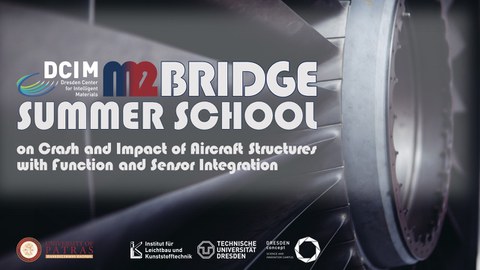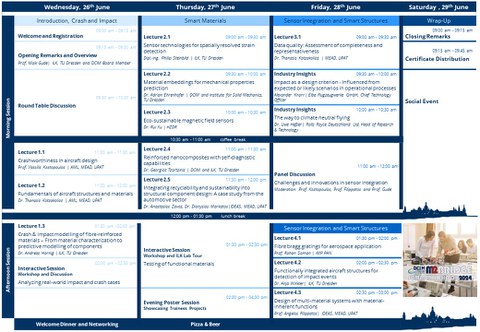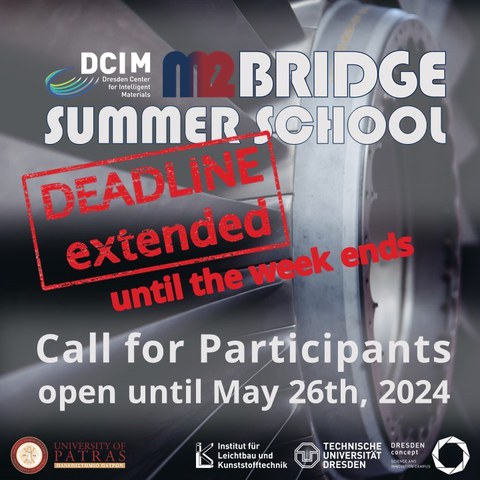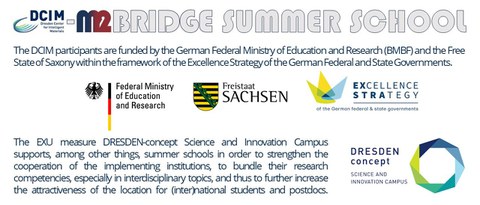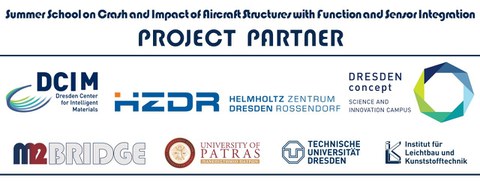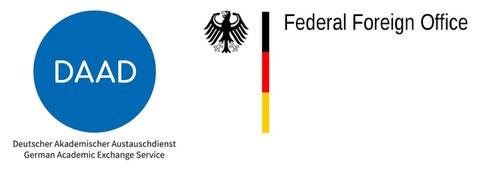M2BRIDGE-DCIM Summer School 2024 in Dresden
Summer School on Crash and Impact of Aircraft Structures with Function and Sensor Integration
Immerse yourself in the fascinating world of aircraft structures and learn all about their crash and impact loads as well as functional integration and structural monitoring using specific sensor technology. Be part of the M2BRIDGE-DCIM Summer School 2024 in Dresden, learn about the latest developments in this field and exchange ideas with experts from Greece and Germany.
The German-Greek project M2BRIDGE of the Institute of Lightweight Engineering and Polymer Technology (ILK), TU Dresden and the Department of Mechanical Engineering & Aeronautics (MEAD), UPAT, is organizing, with the support of the Dresden Center for Intelligent Materials (DCIM), an exciting summer school on Crash and Impact of Aircraft Structures with Function and Sensor Integration from June 25th to 30th, 2024. There are 30 places available for ten outstanding students and PhD students from TU Dresden, UPAT, as well as ten for DCIM members.
The M2BRIDGE-DCIM Summer School 2024 of TU Dresden and University of Patras, with other associated partners and guests from Germany and Greece, will focus on the following topics related to aircraft structures over four days:
1. crash and impact
2. smart materials
3. sensor integration and smart structures
4. data analysis and practical applications
The summer school will guide participants through various aspects of structural and composite material modeling, functional integration and technical best practice approaches. The expected learning outcome is a comprehensive overview of technologies for the design of future aircraft components. Besides technical presentations, the summer school will include exciting hand-on workshops and group competitions. In addition, the participants will therefore get a practical insight into high-velocity testing and will be familiarized with state-of-the-art analysis approaches.
The participants will present their own work in a poster session and the M2BRIDGE prize for the best poster will be awarded. Successful participants will receive a certificate of participation on the last day of the summer school.
The scientific program will be accompanied by various leisure activities and side events such as ILK Lab Tour, Welcome Dinner or Ice-Breaker Networking at the beginning of the summer school. The social event on Saturday will round off the framework program.
Applicant profile and application procedure
You are a student or a PhD student at the TU Dresden or one of the Dresden-concept partners in the field of mechanical engineering, materials science, simulation or test engineering? Do you have scientific interests that overlap with the main topics of the M2BRIDGE-DCIM Summer School 2024? - Then we are looking forward to your application!
Deadline extension until the end of the week. Send in your application by 26.05.2024!
To apply, please send the following documents to by May 26th, 2024:
- Letter of motivation (max. 500 words)
- Short CV (max. 2 pages)
- Transcript of records for current studies/certificates for completed studies
Selection procedure
Participants will be selected on the basis of the application documents submitted. The selection criteria are previous academic performance, motivation for the participation and English language skills of the candidate. In accordance with our equal opportunities standards, we will give preference to applicants from disadvantaged socio-economic backgrounds, minorities and people with special needs, provided they have the same academic qualifications. We strongly encourage female students and doctoral students to apply for participation in the summer school.
Successful applicants will be informed of their selection for participation by the end of May / beginning of June 2024 and invited to make a binding commitment to participate.
Contact for applicants from TU Dresden/Dresden-concept
Radka Roßner, ILK International Affairs Advisor, +49 (0)351 463-37956,
Print-friendly PDF version of the call for applications
Download here.
The DCIM is funding a further ten participant places at the summer school. For further information on DCIM participation, application and financial support, please follow the announcements on the DCIM homepage or use the contact form below.
DCIM Call for Participants
Interested students or doctoral candidates should send an application to by May 31st, 2024. | Further information on the application process: here.
Contact for DCIM applicants
Dr. Georgios Tzortzinis, Research Associate, Intelligent Structures Group, ILK, TU Dresden,
For M2BRIDGE participants from Greece/UPAT we offer a basic financial mobility grant, which includes free accommodation in the International Guest House of the Studentenwerk Dresden (IGH Dresden) and a one-time travel allowance of 425 €. Please note that all payments will be made only as reimbursements after the event and that the financial support for travel and accommodation costs is subject to a minimum attendance of 80% at the event. Successful candidates will receive detailed information from their MEAD/UPAT contact.
There are no participation fees for successful candidates to attend the Summer School and all its program sessions.
Catering (coffee breaks, lunch during the lecture days and dinner during the evening event) will be provided for all participants.
All other costs are the responsibility of the participants and cannot be claimed from the organizer.
The summer school is sponsored by the German Academic Exchange Service (DAAD) within the framework of the M2BRIDGE project with funds from the German Federal Foreign Office (AA).
The DCIM participants are funded by the German Federal Ministry of Education and Research (BMBF) and the Free State of Saxony within the framework of the Excellence Strategy of the German Federal and State Governments as part of the DRESDEN-concept (DDc) Science and Innovation Campus measure. The EXU measure DDc Science and Innovation Campus supports, among other things, summer schools in order to strengthen the cooperation of the implementing institutions, to bundle their research competencies, especially in interdisciplinary topics, and thus to further increase the attractiveness of the location for (inter)national students and postdocs.

